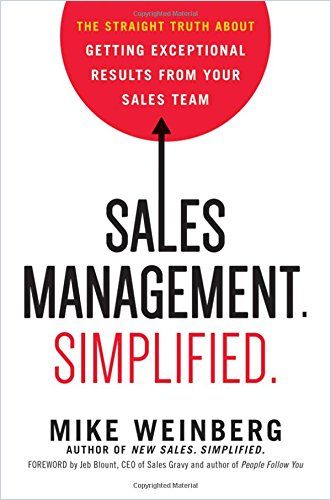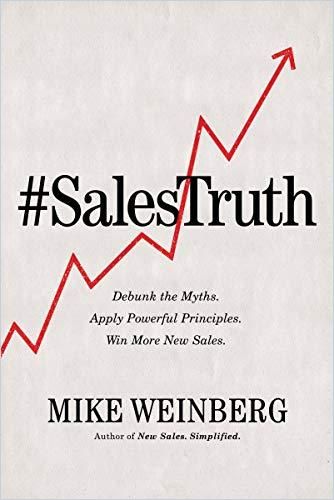Sales coach Mike Weinberg says too many sales managers waste their time in corporate meetings unrelated to their core goal of driving revenue. And they’re not following up on their main task, which is making sure salespeople are hitting their goals.
“The job is to make your salesperson the hero, not to be the hero”

getAbstract: Sales Management. Simplified was published in 2015. How has your advice changed since then?
Mike Weinberg: I’d probably say my advice has gotten simpler and more blunt. I’ve done book presentations on five continents. What amazes me is the issues are the same across industries and geography. I see sales managers that are buried in corporate crap and prevented from doing their primary job, which is leading the sales team. Companies are just burying them with so many non-leadership activities and tasks – meetings and conference calls and admin that has nothing to do with driving revenue or leading the team. The second big issue I’m seeing is sales leaders that are permitting their salespeople to live in reactive mode, and they sit on their butts waiting for an opportunity to chase, instead of going out proactively to chase new opportunities.
The corporate crap you mentioned is such a common theme. Managers complain about spending so much time in meetings. How do you carve out time for higher-value activities?
The highest-producing and most effective executives and sales managers are selfish, and they’re selfish in a good way. I call it selfishly productive. They get really good at saying no. And they also time-block their calendar, and they’re very much aware of their highest-value, highest-payoff activities. Really good sales leaders go into their calendar first, and they carve out time for the three highest-value sales leadership activities. They delegate low-value tasks, and they extricate themselves from nonsense. When their corporate bosses come to them and ask them to come to another meeting, they say, “If you need me leading the team and driving revenue, I can’t sit in that strategy meeting. I can’t sit in that quality control meeting. And I’m not going to have my salespeople volunteer for the Fourth of July barbecue committee. That’s not helping us.” Being really good at being selfish, saying no and time-blocking our calendar is really radically helping sales managers.
How do you balance that? Can you say no to everything without being seen as a prima donna?
There is a balance, but I think most of us are erring on the side of being good corporate citizens and collaborative team players.
I’m going to torpedo the next human resources person who tells me we need a collaborative team player.
What we really need is sales killers out in the field driving new revenue. I’m less interested in collaboration and team players than sales results. That’s a very unpopular view. We don’t want jerks. You do need to be responsible corporately, but there’s way too much corporate responsibility and way too few sales being generated in a lot of companies.
What are the three highest-value sales tasks?
No. 1, the one-on-one manager-salesperson accountability meeting. This is not taking place. It’s very trendy today to talk about coaching and enabling salespeople. What I find missing in most companies is just good management. Not micromanagement but good management, where sales managers hold people accountable for results, pipeline health and activity. No. 2, fieldwork and coaching, where Managers get with their salespeople to inspect what they expect.
Way too many sales managers are saying, “I don’t have time to work with my people.” My response, “I don’t care! That’s your job. It’s not optional.” Drop something else.
No. 3 is preparing for and facilitating sales team meetings. Most sales team meetings are awful. People leave de-energized, and that’s because managers are doing a crappy job with agendas and planning.
Why are sales meetings so bad, and how do you improve them?
While the sales team is gathered, it’s not really a sales meeting. It feels like an operations planning meeting, or a delivery status meeting, or just a giant administrative catch-up session. They’re boring, and the salespeople leave with less energy and no better-equipped to do their jobs. The key litmus test I use is: do your salespeople leave the team meeting with more energy and better equipped to do their job when the meeting is over than when it started? If the answer to that is no, you need to put your sales meetings on hold until you get that figured out.
It sounds like boring meetings are worse than no meetings at all.
Terrible. They’re negative, and no one is getting value. A lot of managers are using sales team meetings as an inappropriate venue for doing cheap accountability. Good accountability takes place in private. There’s a formula in Chapter 20 in the book that’s foolproof. I take no credit for it. It comes directly from my sales mentor, Donnie Williams. He had a 10-minute meeting. It was once a month. I had to answer for results, pipeline health and then, if necessary, activity. When you execute that meeting well, no one can accuse you of being a micromanager, because you always start by looking at results – and honestly, in sales, that’s what really matters. If you do accountability in private, they can use sales team meetings for equipping and training and sharing best practices and role-playing. There’s so much good we could do in sales team meetings if we’d just do it.
You note that sales managers often are former salespeople promoted to a new position. What advice do you give new managers making that transition?
It’s a very hard transition because there is almost nothing similar between the sales management job and the salesperson’s job. People think it’s odd when I say that, but the salesperson wins by being very self-focused, and the sales manager wins by being others-focused. It’s an interesting transition of learning how to subdue your ego. The job is to make your salesperson the hero, not to be the hero.
You’ve got a new book out titled #Sales Truth. Give me the elevator pitch.
This is the book I most wanted to write, and that I feel the sales community most badly needs right now. What I read online, particularly on LinkedIn, from today’s nouveau experts, and what they see as important to succeed in sales today looks very, very different from what I see with my own eyes in real companies where I consult and train.
I’m angry because of the charlatans preaching stupid nonsense on LinkedIn about sales, and making fun of traditional selling methodologies.
In the book, I debunk the nouveau myths and I share what it takes today to be a top producer, with real stories from real companies and real salespeople. The book is brutally direct.
What are the common traits you see in top salespeople?
They are masters at creating their own opportunities, and they take full responsibility for keeping the top of the sales funnel full. Top producers also have mastered the basics and the fundamentals. The very best salespeople don’t have hacks or tricks or shortcuts. And they don’t brag about what tools they’re using, or what newfangled process they’re using. The very best salespeople I know work their ass off. They know their business. They know their customers. They know their competitors. They prepare and practice like crazy when they’re backstage so when they’re on stage in front of their customers, they’re at the top of their game. There are no tricks or shortcuts. You have to do the word.
Mike Weinberg is a consultant, coach, speaker, and bestselling author of Sales Management. Simplified and #Sales Truth. He has become one of the most trusted and sought after sales experts in the world today.
Next steps
For more management and sales strategies, visit getAbstract’s library and our related channels like Sales, Complex Sale, and Sales Management.









